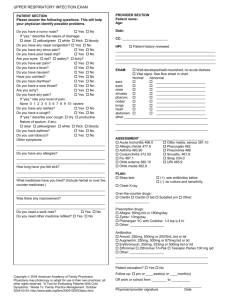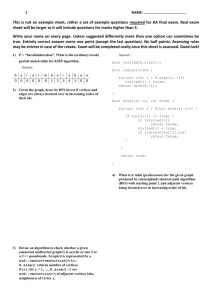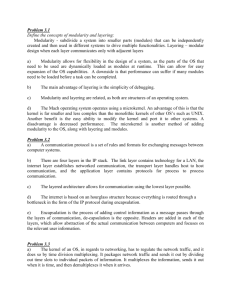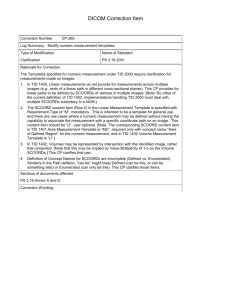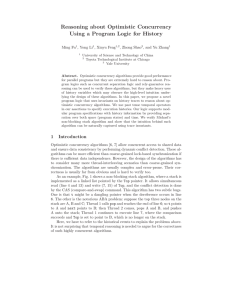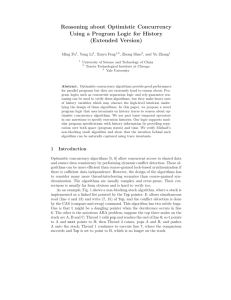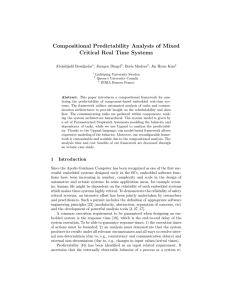CS 345 Homework #2
advertisement
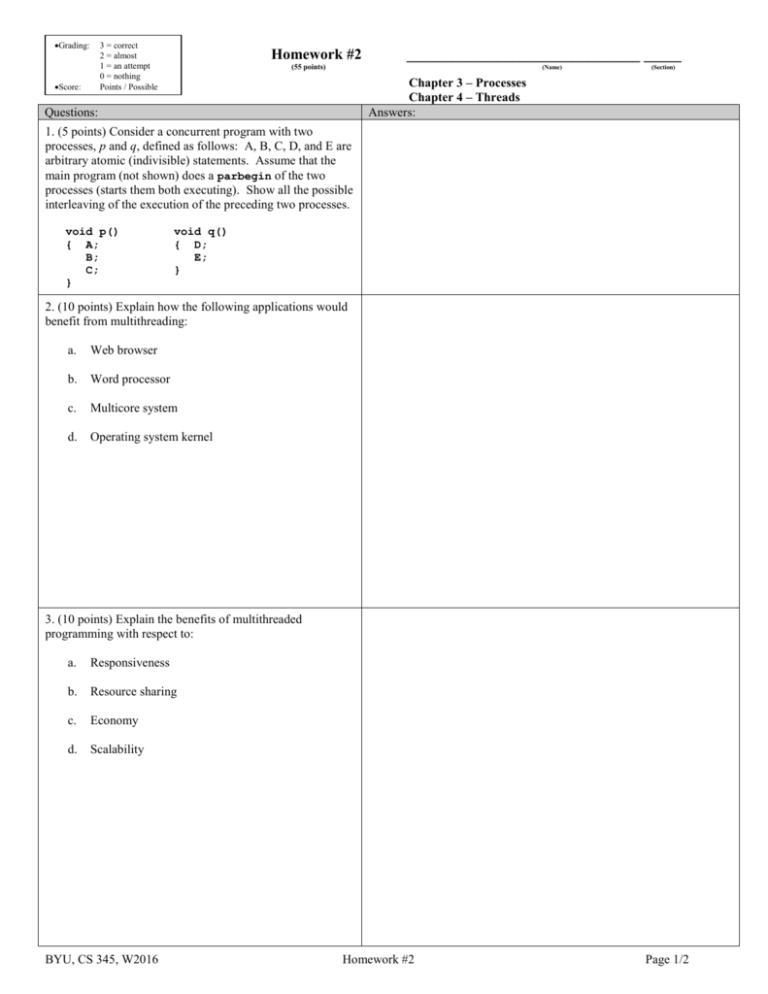
Grading:
3 = correct
2 = almost
1 = an attempt
0 = nothing
Points / Possible
Score:
Homework #2
_______________________________ _____
(55 points)
(Name)
(Section)
Chapter 3 – Processes
Chapter 4 – Threads
Answers:
Questions:
1. (5 points) Consider a concurrent program with two
processes, p and q, defined as follows: A, B, C, D, and E are
arbitrary atomic (indivisible) statements. Assume that the
main program (not shown) does a parbegin of the two
processes (starts them both executing). Show all the possible
interleaving of the execution of the preceding two processes.
void p()
{ A;
B;
C;
}
void q()
{ D;
E;
}
2. (10 points) Explain how the following applications would
benefit from multithreading:
a.
Web browser
b.
Word processor
c.
Multicore system
d.
Operating system kernel
3. (10 points) Explain the benefits of multithreaded
programming with respect to:
a.
Responsiveness
b.
Resource sharing
c.
Economy
d.
Scalability
BYU, CS 345, W2016
Homework #2
Page 1/2
4. (15 points) Elaborate on the programming challenges of
multithreading applications.
a. Identifying units of work (tasks)
b. Balance
c. Data splitting
d. Data dependency
e. Testing and debugging
5. (15 points) The output of the C program to the right is:
tid=0,
tid=1,
tid=2,
tid=3,
tid=0,
tid=1,
tid=2,
tid=3,
count=1
count=1
count=1
count=1
count=2
count=2
count=2
count=2
Answer the following questions:
a) Where in memory would you find the variable i (heap,
kernel stack, thread stack)?
b) Why is the variable count equal to 1 for the first four
printf‘s in function myThread and then changes to 2?
c) What is the purpose of the setjmp function on line 025?
d) How many times is the function myThread called? What is
the value of code when the function is called?
e) What C statement is executed just after line 041 is
executed for the 5th time?
BYU, CS 345, W2016
001 #include <setjmp.h>
002 #include <stdio.h>
003 #include <stdlib.h>
004 #include <ctype.h>
005
006 #define NUM_THREADS 4
007 #define STACK_SIZE (64*1024)
008 #define STACK_END (STACK_SIZE/sizeof(int*))
009 volatile void* stack;
// stack
010
011 int tid;
// thread id
012 jmp_buf thread[NUM_THREADS];
// thread context
013 jmp_buf kernel;
// kernel context
014 void myThread(int);
// thread function
015
016 int main()
017 {
018
int i, code;
019
for (tid = 0; tid < NUM_THREADS; tid++)
020
{
021
if (setjmp(kernel) == 0)
022
{
023
stack = (int*)malloc(STACK_SIZE) + STACK_END;
024
_asm("movl _stack,%esp"); // new stack pointer
025
if (!(code = setjmp(thread[tid]))) longjmp(kernel, 1);
026
myThread(tid);
027
}
028
}
029
for (i = 0; i < 12; i++)
030
{
031
tid = i % NUM_THREADS;
// select next thread
032
if (!(code = setjmp(kernel))) longjmp(thread[tid], 2);
033
}
034 }
035
036 void myThread(int tid)
037 {
038
int count = 0;
// task iteration counter
039
while (1)
040
{
041
if (!setjmp(thread[tid])) longjmp(kernel, 3);
042
printf("\ntid=%d, count=%d", tid, ++count);
043
}
044 }
Homework #2
Page 2/2



